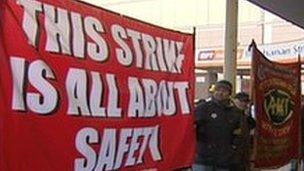RMT rail union to take legal action
- Published

RMT members staged walkouts earlier this year
Union leaders are to take legal action against First ScotRail in a dispute over the use of train conductors.
The move marks a change in tactics by the RMT union, which staged a series of walkouts over the issue earlier this year.
The dispute started over plans to employ ticket examiners rather than conductors on the new Airdrie to Bathgate line.
The RMT announced it would now focus on a legal and political campaign.
The union has argued that conductors, or guards, were best equipped to deal with serious incidents and claimed the plan would "jeopardise" passenger safety.
It said guards had an important health and safety role, such as managing evacuation procedures or taking control of the train if something happened to the driver.
RMT said ticket examiners only ensured passengers paid rather than also ensuring their safety, and they did not always remain on a train for the whole journey.
But First ScotRail has insisted the trains would be no different to those which had operated in Strathclyde for 25 years.
The union said its legal challenge would be based on the alleged failure of First ScotRail to adhere to a binding agreement with RMT not to extend driver-only operations.
It added that it had a "concrete legal opinion" that the agreement, signed back in 2001, was still valid.
General secretary Bob Crow said today: "Our members on ScotRail have shown their determination to defend the safety-critical role of the guard on their services and to stop the profit-driven dash to extend driver-only operations.
"The fight to defend the guards on ScotRail services was always about putting public safety above private profit."
The union said it expected its legal challenge to reach the courts in the autumn.
The RMT also plans to step up a political campaign, targeted at the Scottish government, over the current franchise agreement on safe staffing levels on services.
Hundreds of workers took part in a series of strikes in February, March and April.
First Minister Alex Salmond urged the union and management to resolve the "unnecessary dispute" when the issue was raised in the Scottish parliament at the time.